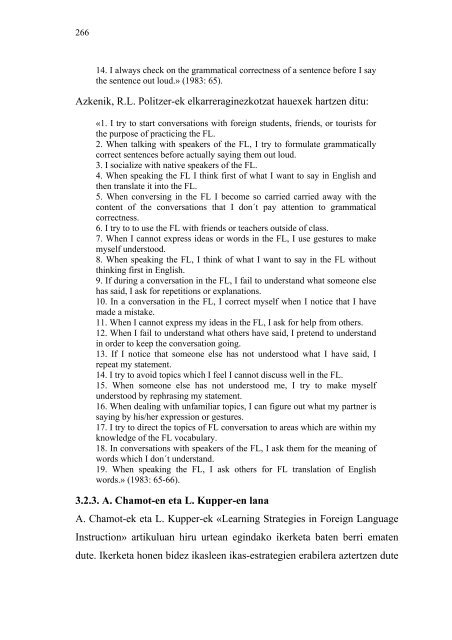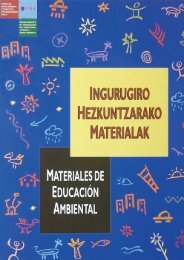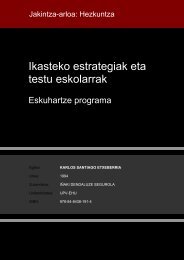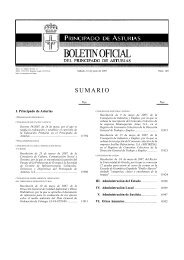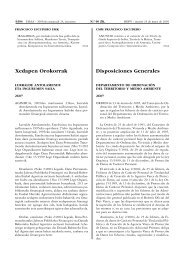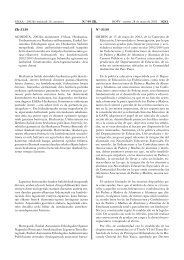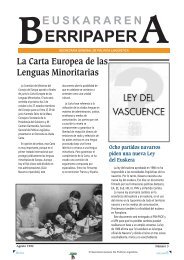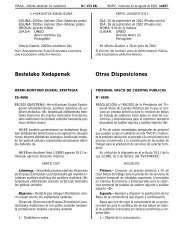- Page 1 and 2:
Jakintza-arloa: Pedagogia Estrategi
- Page 3 and 4:
ikusitakoan, ikasleen ikas-estrateg
- Page 5 and 6:
AURKIBIDEA SARRERA ................
- Page 7 and 8:
3.2.5. M. O´Malley-ren, A. Chamot-
- Page 9:
4.2.2.7. Taldekatzea eta izendatzea
- Page 12 and 13:
8 eskoletako errealitatearen berri
- Page 14 and 15:
10 diren terminoen zehaztapena egit
- Page 16 and 17:
12 honetan ikertzen jarraitu nahi d
- Page 19 and 20:
1.1. Sarrera 1.1.1. Marko orokorra
- Page 21 and 22:
1. Euskara dakiten gurasoek beren s
- Page 24:
20 Hizkuntzaren jarraipena
- Page 31 and 32:
2001eko inkestetatik ateratako ondo
- Page 33 and 34:
urtarrilaren 24ko aginduan Helduen
- Page 35 and 36:
dutenez, hauexek dira ikasle matrik
- Page 37 and 38:
mailan, edozein gai zein egoeraren
- Page 39 and 40:
1.1.1.3. Ikasleen usteak 2001eko in
- Page 41 and 42:
cometemos errores.» (8. urratseko
- Page 43 and 44:
«Para mí lo que más difícil me
- Page 45 and 46:
«Rechazo de la traducción y de la
- Page 47 and 48:
Garrantzi berezia ematen zaio ahosk
- Page 49 and 50:
1.2.5. Metodo kognoszitiboa Eredu k
- Page 51 and 52:
kritiko zorrotza egin ondoren, dio
- Page 53 and 54:
«Planteamendu komunikatiboak lortu
- Page 55 and 56:
«Ildo beretik, hizkuntza arrotzen
- Page 57 and 58:
pedagogikoak eta tresneria edo lane
- Page 59 and 60:
ENFOQUES COMUNICATIVOS ENFOQUE NOCI
- Page 61 and 62:
ikasleak jakin beharreko gaitasunak
- Page 63 and 64:
Azken batean ikaslea bera da erabak
- Page 65 and 66:
dizkio: aztertzeko modukoa eta bolu
- Page 67 and 68:
hizkuntzaren atal batzuk (fonologia
- Page 69 and 70:
normala apurtzen da, eta ondorioz,
- Page 71 and 72:
hizkuntzaren eskurapenean. Baina ba
- Page 73 and 74:
S. Krashen-ek argi utzi du hipotesi
- Page 75 and 76:
Adquisición s. eskuratze, eskurape
- Page 77 and 78:
Jabekuntzaren esparruan AUTOREA IZE
- Page 79 and 80:
Gardner-en eredua 1.urratsa 2.urrat
- Page 81 and 82:
Splosky-ren eredua Motibazioa Testu
- Page 83 and 84:
gainekoak» direla uste dute. E. Bi
- Page 85 and 86:
«Strategy 1: Active task approach:
- Page 87 and 88:
1. Errepikatzea. 2. Ikasgelan hotsa
- Page 89 and 90:
1. H1 edo beste hizkuntzaren bat er
- Page 91 and 92:
la ambigüedad, empatía, dependenc
- Page 93 and 94:
txarrek erabiltzen dituzten estrate
- Page 95 and 96:
ikaskuntzaren esparrutik definitu d
- Page 97 and 98:
Hizkuntzalaritzaren esparruan ere a
- Page 99 and 100:
IKAS-ESTRATEGIA SOZIO-AFEKTIBOAK EZ
- Page 101 and 102:
IKAS-ESTRATEGIA KOGNITIBOAK EZAUGAR
- Page 103 and 104:
Beraz, J. Willis-entzat ikasle ona
- Page 105 and 106:
101 ere aipatzen dituzte. Dena den,
- Page 107 and 108:
jabekuntza aztertu dituzten lanak e
- Page 109 and 110:
BOGAARDS, P. Gaitasuna eta afektibi
- Page 111:
107 SAINZ, M. «Hizkuntza didaktika
- Page 114 and 115:
110 seleccionar los contenidos impo
- Page 116 and 117:
112 2.2. Azterketa enpirikoaren met
- Page 118 and 119:
114 (159) M. O´Malley eta A. Chamo
- Page 120 and 121:
116 aldeak ez bakarrik deiturari da
- Page 122 and 123:
118 Esan bezala, galdetegiaren goik
- Page 124 and 125:
120 15. Agrupo palabras por su form
- Page 126 and 127:
122 diccionario. (Estrategia metako
- Page 128 and 129:
124 intento relajarme. (Estrategia
- Page 130 and 131:
126 ariketa 6 jakin bat egiteko eta
- Page 132 and 133:
128 2.3.1. Ikasleriari egindako ika
- Page 134 and 135:
130
- Page 136 and 137:
132 2.3.1.1.3. Adina Asko izan dira
- Page 138 and 139:
134 abiatuta, goi eta erdi-mailako
- Page 140 and 141:
136 2.3.1.1.6. Sexua Hizkuntzen ika
- Page 142 and 143:
138 ikasleriaren aldagaiak kontuan
- Page 144 and 145:
140 3. Relaciono lo que ya sé con
- Page 146 and 147:
142 5. Cuando busco una palabra en
- Page 148 and 149:
144 7. Cuando aprendo palabras o fr
- Page 150 and 151:
146 9. Regularmente repaso los tema
- Page 152 and 153:
148 11. Cuando no entiendo una pala
- Page 154 and 155:
150 13. Deduzco el significado de l
- Page 156 and 157:
152 15. Agrupo palabras por su form
- Page 158 and 159:
154 17. Practico los sonidos de las
- Page 160 and 161:
156 19. Comienzo una conversación
- Page 162 and 163:
158 21. Leo por placer en euskera.
- Page 164 and 165:
160 23. Primero leo por encima un t
- Page 166 and 167:
162 25. Busco el significado de las
- Page 168 and 169:
164 27. Hago resúmenes para estudi
- Page 170 and 171:
166 29. Intento buscar parecidos y
- Page 172 and 173:
168 hiztegi edo liburu batean konts
- Page 174 and 175:
170 Alde horiek gerta daitezke ikas
- Page 176 and 177:
172 markatua izateak arrazoi asko i
- Page 178 and 179:
174 Bi ikaslek izan ezik, beste guz
- Page 180 and 181:
176 33 ikasle, gutxitan. Egindako a
- Page 182 and 183:
178 40. Organizo mis quehaceres cot
- Page 184 and 185:
180 19. Comienzo una conversación
- Page 186 and 187:
182 43. Aprovecho cualquier situaci
- Page 188 and 189:
184 %81 inguruk beti edo sarritan k
- Page 190 and 191:
186 47. Planeo mi horario para tene
- Page 192 and 193:
188 49. Reflexiono sobre mis progre
- Page 194 and 195:
190 51. Cuando no sé cómo expresa
- Page 196 and 197:
192 53. Cuando tengo miedo (en caso
- Page 198 and 199:
194 Ikasle batek izan ezik, beste g
- Page 200 and 201:
196 270 ikaslek adierazi du beti, s
- Page 202 and 203:
198 270 ikaslek markatu dute gainer
- Page 204 and 205:
200 61. Si estoy tenso o nervioso e
- Page 206 and 207:
202 Gainera, gehiengoak %92,3k, 250
- Page 208 and 209:
204 %26,9k, 73 ikaslek, gutxitan; %
- Page 210 and 211:
206 2.3.1.2.2.2. Ikasleriaren aldag
- Page 212 and 213:
208 Ondorengo orrietan froga biak i
- Page 214 and 215:
210
- Page 216 and 217:
212 9 urratsak) mailakoen arteko es
- Page 218 and 219:
214 Mailen arabera, ikas-estrategia
- Page 220 and 221: 216 Estrategia kognitiboen batez be
- Page 222 and 223: 218 Ikus daitekeen bezala, badago i
- Page 224 and 225: 220 2.3.2.2.1. Item bakoitzaren gai
- Page 226 and 227: 222 3. Ariketa bat egin ostean, ari
- Page 228 and 229: 224 irakasleriak badu ikas-estrateg
- Page 230 and 231: 226 7. Egoerak sortzen ditut, eskol
- Page 232 and 233: 228 9. Zerbait azaltzen ari naizene
- Page 234 and 235: 230 11. Ikastaroan zehar programatu
- Page 236 and 237: 232 13. Eduki gramatikalen inguruan
- Page 238 and 239: 234 15. Zerbait azaltzeko edota err
- Page 240 and 241: 236 17. Lehenengo, irakatsitako hiz
- Page 242 and 243: 238 19. Ikasleek ahozko edo idatziz
- Page 244 and 245: 240 21. Egunkariko artikulu bat gai
- Page 246 and 247: 242 23. Noizbehinka etxerako lanak
- Page 248 and 249: 244 25. Ikasleei bere burua ebaluat
- Page 250 and 251: 246 27. Ikasleei argitu eta egiazta
- Page 252 and 253: 248 29. Ikasleei erlaxatzen laguntz
- Page 254 and 255: 250 2.3.2.2.2. Irakasleak egin beha
- Page 256 and 257: 252 2.3.2.2.3. Irakasleak bost atal
- Page 258 and 259: 254 Irakasleek, ordea, gehien ikas-
- Page 261 and 262: 3.1. Sarrera 3. ONDORIO OROKORRAK L
- Page 263 and 264: Ikas-estrategia metakognitiboak has
- Page 265 and 266: Goiko mailetan zeuden ikasleek behe
- Page 267 and 268: 263
- Page 269: 8. I read FL magazines, newspapers
- Page 273 and 274: Emakumeek gizonek baino ikas-estrat
- Page 275 and 276: 271 preparation, directed attention
- Page 277 and 278: 273 eta basic eta prebasic mailakoa
- Page 279 and 280: ingelesa bigarren hizkuntza bezala
- Page 281 and 282: ehearsal, grouping, substitution, i
- Page 283 and 284: 279 honela dio: Agrupo palabras por
- Page 285 and 286: 17. Practico los sonidos de las pal
- Page 287 and 288: 3.3.1.1.2. Ikas-estrategia metakogn
- Page 289 and 290: 37. Me doy cuenta de mis errores e
- Page 291 and 292: 3.3.1.2. Ikasleriaren aldagai batzu
- Page 293 and 294: erabileraren bultzatzea ez da oso a
- Page 295: O´MALLEY, J.M., et. al. «Learning
- Page 298 and 299: 294 bideratuago baitaude. Dena dela
- Page 300 and 301: 296 honako hauek: ibar, pinu, pago,
- Page 302 and 303: 298 4.1.1.2.2. B ataza: «Golokari
- Page 304 and 305: 300 4.1.1.3.1. A ataza: «Pelikular
- Page 306 and 307: 302 otsokumeak, mantsotu, etxe-txak
- Page 308 and 309: 304 4.1.1.4.4. 5. ataza: «Tento tx
- Page 310 and 311: 306 Helburu horiek lortzeko ataza h
- Page 312 and 313: 308 ikasleei ikustaraztea hizkuntza
- Page 314 and 315: 310 «Nik ere bai» elkarrizketare
- Page 316 and 317: 312 «Unitate honetan leku nabarmen
- Page 318 and 319: 314 ulertzea. Helburu hori lortzeko
- Page 320 and 321:
316 Mapa semantikoa denen artean z
- Page 322 and 323:
318 4.1.2.6.1. A ataza: «Ez gatz e
- Page 324 and 325:
320 Klaseko jarduerak aztertu eta
- Page 326 and 327:
322 Helburu horiek lortzeko prozedu
- Page 328 and 329:
324 «Ikas-estrategiak. Irakurketa-
- Page 330 and 331:
326 ulertzeko aholkuak edo antzeko
- Page 332 and 333:
328 4.1.3.5. Euskal balea unitate d
- Page 334 and 335:
330 «Solaskideen aurkezpen laburra
- Page 336 and 337:
332 Hitz-zerrenda bat emango zaie
- Page 338 and 339:
334 Ataza honetan mapa-semantikoa e
- Page 340 and 341:
336 ehun pototan gordea dauka. Horr
- Page 342 and 343:
338 Mathematics word problems Res
- Page 344 and 345:
340 ematen. Izan ere, gainerako mat
- Page 346 and 347:
342 Praktika1: Izaki bizidunei buru
- Page 348 and 349:
344 B. Ikasleek mikroskopiorik ez
- Page 350 and 351:
346 Ikasleentzako orriak: (215)
- Page 352 and 353:
348 (217)
- Page 354 and 355:
350 4.2.1.2. European colonies in N
- Page 356 and 357:
352 Aipatuko den lexikoaren hizteg
- Page 358 and 359:
354 C. Ikasleek Plymoutheko koloni
- Page 360 and 361:
356 STUDENT ASSESSMENT FORM Record
- Page 362 and 363:
358 Ikasleentzako orriak: (275)
- Page 364 and 365:
360 (277)
- Page 366 and 367:
362 4.2.1.3. A Folk tale from Japan
- Page 368 and 369:
364 Echizen-no-Kami (eh-chi-zehn´
- Page 370 and 371:
366 Zailtasunak antzemango dira eta
- Page 372 and 373:
368 STUDENT ASSESSMENT FORM Record
- Page 374 and 375:
370 (308)
- Page 376 and 377:
372 (310)
- Page 378 and 379:
374 (312)
- Page 380 and 381:
376 4.2.2.1. Ikas-estrategiak ezagu
- Page 382 and 383:
378 Keep quiet Listening in Looking
- Page 384 and 385:
380 Writer´s cramp 4.2.2.2. Ikas-e
- Page 386 and 387:
382 speaking French in the play, bu
- Page 388 and 389:
384 Ariketa hau egiteko 20-45 minu
- Page 390 and 391:
386 Ikasleak A zerrendako informaz
- Page 392 and 393:
388 4.2.2.12. Erantzun fisikoa. (10
- Page 394 and 395:
390 4.2.2.16. Testu-zati bat aztert
- Page 396 and 397:
392 ikasleek euren ama-hizkuntzan h
- Page 398 and 399:
394 Fitxa bakoitzaren atzeko aldean
- Page 400 and 401:
396 4.2.2.26. Elkarrizketak. (129-1
- Page 402 and 403:
398 3. Neurtu baliabideak. Ikasleak
- Page 404 and 405:
400 Nola egin: irakasleak ikasleei
- Page 406 and 407:
402 _______________________________
- Page 408 and 409:
404 Nola egin: irakasleak ikasleei
- Page 410 and 411:
406 Edota beste hau: 1. Laxatu arr
- Page 412 and 413:
408 Part A 5 minutuko ariketa da.
- Page 414 and 415:
410 Nola egin: irakasleak bere ika
- Page 416 and 417:
412 Acquisition: Theory, Practice,
- Page 418 and 419:
414 HABE. Nolako txakurra, halako j
- Page 420 and 421:
416 Strategic Interaction and Langu
- Page 423 and 424:
1. Irakasleentzako galdetegia ERANS
- Page 425 and 426:
2. Ikasleentzako galdetegia Subraye
- Page 427:
46- Intento averiguar cómo ser mej


